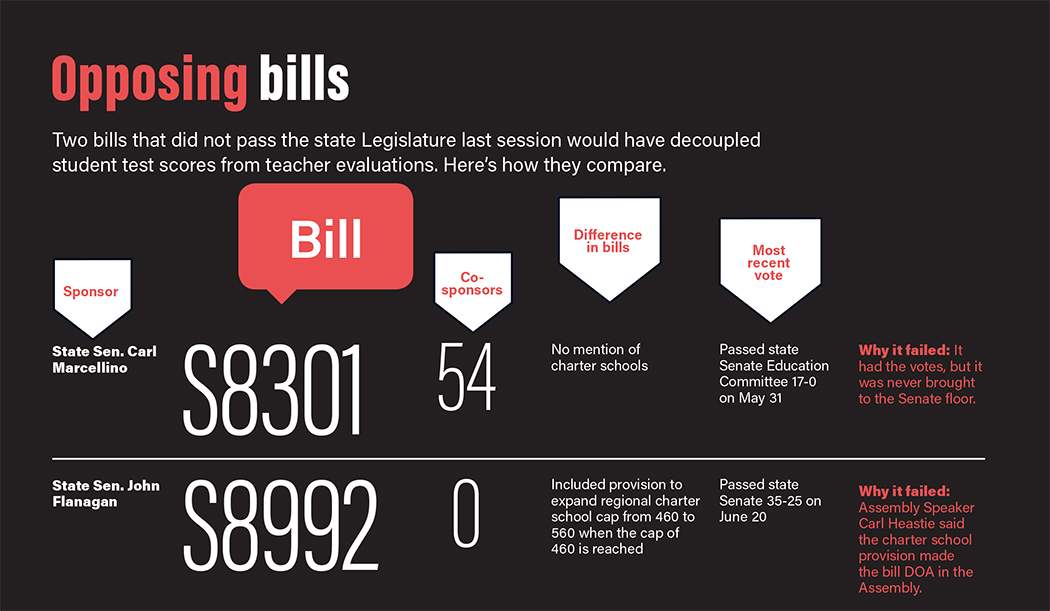An effort to change how student test scores factor into performance evaluations for public school teachers seemed to be a done deal just two months ago, but the failure of the state Senate to pass a bill in the waning days of the legislative session is coming back to haunt incumbents in both parties.
New York State United Teachers has promised a “tremendous show of force” against the five Democrats who voted for a Republican bill that tied the proposed changes to evaluations to more funding for charter schools. The union did not endorse any Democrat who voted for the bill, and has also poured money into the campaign of Jim Gaughran, a Democrat who is challenging Republican state Sen. Carl Marcellino of Long Island in the upcoming election.
NYSUT’s $11,000 contribution to Gaughran through its political action committee is the largest contribution he’s received and came just a few weeks after Marcellino voted for a bill proposed by state Senate Majority Leader John Flanagan in lieu of Marcellino’s own bill, which focused on delinking test scores from teacher evaluations and had appeared to be on a path to passing the state Legislature just weeks before. The Assembly passed a similar bill and Gov. Andrew Cuomo appeared ready to sign the changes into law.
“The fact that this bill was not even brought up for a vote by the Senate Republican majority is ridiculous,” state Sen. Andrea Stewart-Cousins, the Senate Democratic leader, said in an email. “Clearly the only way this legislation will be passed into law is by having new leadership in the State Senate, and a functional Democratic majority.”
“The fact that this bill was not even brought up for a vote by the Senate Republican majority is ridiculous.” – state Senate Democratic leader Andrea Stewart-Cousins
Support for Flanagan’s bill was a deal-breaker between the union and former state Senate Independent Democratic Conference members Jeff Klein, Diane Savino and David Valesky, as well as state Sen. Kevin Parker, a mainline Democrat, according to union leader Andrew Pallotta. Pallotta said in a telephone interview that there are plans to deploy union members to make phone calls and knock on doors to battle against their re-elections – a notable setback for the four state senators who received the union’s backing two years ago.
“It just stands out as something that will weigh heavily on them,” Pallotta said. “When the union gets motivated, look out.”
State Sen. Simcha Felder, who also voted for Flanagan’s bill, was not endorsed by the union in 2016 nor this year. Felder is nominally a Democrat, but has caucused with the Republicans since he took office.
NYSUT, which represents K-12 teachers as well as SUNY and CUNY faculty, has pushed for years to create an evaluation system for teachers that would not rely on tests. Student performance on standardized tests were incorporated into the teacher assessment system in 2010. Their importance increased five years later per new legislation, but a backlash led by NYSUT resulted in a five-year moratorium on using student test performance in evaluations. Opposition to standardized tests more generally had also catalyzed opposition among parents across the country. Hundreds of thousands of students eventually opted out of taking tests based on the controversial Common Core educational standards in protest.
“When the union gets motivated, look out.” – Andrew Pallotta, NYSUT president
The bill proposed by Marcellino would have eliminated the role of state tests in teacher evaluations, which in turn would then be determined by local school districts. Though it eventually received widespread support in both houses of the state Legislature, it may fall by the wayside in the early months of the upcoming state legislative session. School funding will take precedence at that time, according to Pallotta, who declined in the interview with City & State to say whether the union would back the bill again in the same form.
Flanagan’s bill included much of the same language as Marcellino’s, including a repeal of annual professional performance reviews, but included controversial provisions that would have expanded the regional charter school cap by 100 schools, diminished oversight of private yeshivas and increased funding for charter schools. It passed the state Senate 35-25 on June 20 as the session wrapped up. “This bill is the best way forward,” Flanagan said in a statement that day.
But Assembly Speaker Carl Heastie declared Flanagan’s bill dead on arrival, likening the charter school provisions to legislative “cyanide.” And in the case of state Sen. Jeff Klein, the controversial vote means he will not receive money from a union whose political action committee, Voice of Teachers for Education, was among his biggest contributors just a few years ago.
As he fights off a tough primary challenge from Alessandra Biaggi, Klein has faced some notable fundraising setbacks in recent weeks. Now he also has to deal with 600,000 state teachers and university faculty who are looking to do what they can to keep candidates they once endorsed, plus Felder, from winning re-election.
“This,” Pallotta said, “is personal.”



